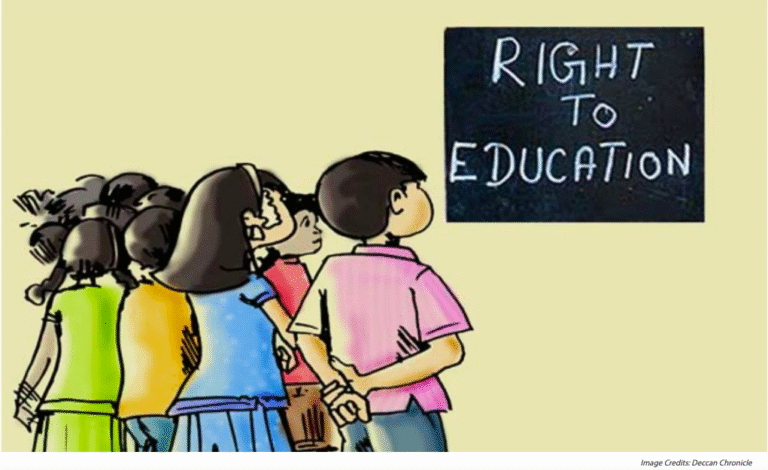
Tanya Aggarwal, Simran Khara write: Schools need not be opened tomorrow but, at the very least, a move towards policy interventions should be made.
Other than opening sporadically for older children, schools have remained closed since March 2020. Education has been conspicuous by its absence from government agendas. We understand the concern around safety. But, as parents, the focus on opening indoor spaces other than schools is worrying.
Children should not grow up in isolation. Safety must be balanced with physical and mental development. As a fourth-grade teacher in the US described it, virtual learning has reduced the “collaborative magic of the classroom into little more than an instructional video”.
Teachers try their best but have limited ability to teach fundamental concepts and enforce discipline; young students have limited ability to learn. Concerns around screen-time have reduced school hours by one-third for our young children. It is obvious that academic development will suffer. More importantly, behavioural changes such as impatience and aggression are emerging. Older children are susceptible to depression. Children cannot play sports. They talk like adults. Long-term effects may manifest years later.
School closures have resulted in the slow death of many a parent’s dream – that education will ensure their children do not share their fate. The elected leadership may not want to admit it, but Digital India is still some time away. According to Save the Children, during the first wave in 2020, three out of every four children had no internet access and four out of five children reported obstacles to learning (including inability to understand and too many chores).
Many families would have more than one school-going child, but one smartphone, if at all. Many parents cannot assist their children given their own lack of education. When our children’s teacher asked about the highlight of the summer break, one child said she had taken tuition classes — at age five.
Many children have been deprived of mid-day meals, thereby increasing the burden on already struggling families — there are reports of children being forced into child labour and marriage.
Parents are another casualty — they did not account for teaching duties for 15 months (and counting). Things may be easier for those who can work remotely, but some, usually women, have left or will leave their jobs.
Based on inputs from leading paediatricians in India, the United Kingdom, and the United States, the Lancet COVID-19 Commission India Task Force recently recommended reopening of schools, in a phased manner with adequate safeguards, as Covid-19 cases decrease. An expert committee led by Devi Shetty also recommended reopening of schools in Karnataka with safeguards.
The rationale for school closure is safety. When our children’s teacher asked them their favourite day of the week, one child said Saturday because she goes to the mall. Even if children stay home, they are exposed if adults go out. In May 2021, a virologist predicted that the third wave is “likely to attack children predominantly”.
Within two weeks, the Indian Academy of Paediatrics stated that it was highly unlikely that the third wave will predominantly or exclusively affect children, there was no evidence to suggest that a majority of infected children will develop severe disease, and almost 90 percent of infections in children so far were mild or asymptomatic. The Lancet COVID-19 Commission India Task Force corroborated this view. Why is, then, school the only dangerous indoor space for children?
India’s failure to designate school staff as frontline workers was a costly mistake. On the contrary, government school teachers were deployed for elections and management of quarantine centres. More than 1,500 teachers died in Uttar Pradesh alone — an irreparable and avoidable loss. According to a recent Israeli study, for every 20 percentage point increase in the share of vaccinated 16- to 50-year-olds, the share of unvaccinated under 16 years who tested Covid positive decreased by half. In simpler terms, “widespread vaccination of adults helps protect unvaccinated children”.
In respect of the Delta variant outbreaks in Israel, there is no complementary rise in hospitalisations so far, and the focus is on masks instead of restrictions, vaccines instead of lockdowns. It is not too late for nationwide prioritisation of school staff for vaccinations in India.
Nothing is risk-free. Schools cannot remain closed until each child is vaccinated because this may take years. We are not asking for schools to be opened tomorrow, but at the very least, a move towards policy interventions should be made.
Indian scientists can conduct their own version of the Israeli study. Our elected leadership must consult experts to apply what we know about Covid-19 to formulate a roadmap for safe reopening of schools — for example, a hybrid model could create or restore connections between teachers and students and improve the efficacy of virtual classes. Coursework may need to be rescheduled to compensate for learning loss — as Esther Duflo recently told The Financial Times, “One year without schooling… could turn into just a completely wasted cohort because you don’t catch up”. Schools will need to implement measures such as sanitisation, frequent testing, ventilation, reduction in class sizes and staggered drop-off and pick-up.
The above will involve considerable effort and cost, and it may entail start-stop openings and closures, but with appropriate safeguards, this will reinstate children and teachers in the classroom and parents in the workforce.
Businesses are open for the sake of the economy. According to the Asian Development Bank, every year of schooling lost is equivalent to 9.7 per cent less in potential earnings; the estimated present value of learning losses due to prolonged school closures in developing Asia (including India) is $1.25 trillion or 5.4 per cent of the region’s 2020 GDP.
Education is the only way India will emerge from the clutches of poverty. Our future generations are not only being deprived of an education but are also undergoing physical and mental damage. We can do everything to save ourselves today, but prolonged school closures are jeopardising the future, perhaps in ways we do not yet understand.
Source : TheIndianExpress



